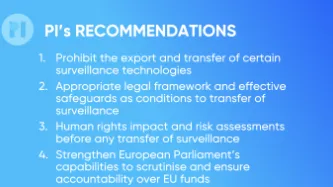Search
Content type: Advocacy
In August 2024 the UK College of Policing (CoP) announced they were consulting on new guidance for data ethics and data driven technologies in policing. As part of the consultation the College asked for feedback on two new authorised professional practices (APP) on data ethics and data-driven technologies. PI provided a response in writing to the CoP on their APP on data ethics and data-driven technologies only.In our response we highlighted that we are aware that UK police forces are using a…
Content type: Advocacy
PI Opening Statement at PEGA Hearing on "Spyware used in third countries and implications for EU foreign relations"
Thank you very much for offering me the opportunity to give evidence before this Committee for another time on behalf of Privacy International (or PI) – a London-based non-profit that researches and advocates globally against government and corporate abuses of data and technology.
My opening statement will first briefly touch on the EU foreign policy’s priorities. I will…
Content type: News & Analysis
Planning and participating in peaceful protests against governments or non-state actors’ policies and practices requires the capacity of individuals to communicate confidentially without unlawful interference. From protests in support of LGBTI rights to protests against specific projects that undermine local communities’ wellbeing, these movements would not have been possible without the ability to exchange ideas and develop plans in private spaces.
Unlawful interference with…
Content type: News & Analysis
This blog was written by Fundación Karisma, a member of the Privacy International Network. It does not necessarily reflect the views or position of Privacy International.
The Colombian General Prosecutor said recently that the blocking of IMEI is not working. He is talking about a registry created in 2011 that aims to reduce cellphone theft by blocking reportedly stolen phones of Colombian networks.
Fundación Karisma has been following this program and now, after six years…



